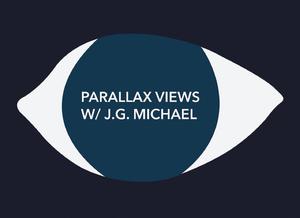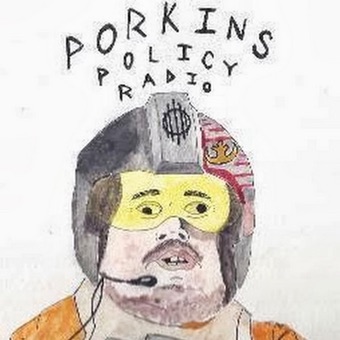
Parallax Views w/ J.G. Michael
J.G.
- 40 minutes 8 secondsFormer UNRWA Chief Spokesperson on the Implications of Israel's UNRWA Ban w/ Chris Gunness
In this hard-hitting episode of Parallax Views w/ J.G. Michael, we welcome Chris Gunness, former Director of Communications and Advocacy for the United Nations Relief and Works Agency (UNRWA), to discuss Israel's controversial ban on UNRWA and its far-reaching consequences for both Palestinians and Israelis. With the Knesset's legislation poised to expel UNRWA from Jerusalem and restrict its humanitarian operations, the episode delves into the grave repercussions of this move, including its impact on over 63,000 Palestinian refugees in East Jerusalem and the broader implications for regional stability.
Gunness breaks down how this decision not only undermines UNRWA’s vital services, such as education, healthcare, and food aid, but also sets the stage for the de facto annexation of Jerusalem in violation of international law, as highlighted by the International Court of Justice's (ICJ) recent ruling.
Tune in for a compelling discussion that unpacks the complex layers of this issue and why it’s not only a humanitarian crisis but also a political and moral one that could harm not only Palestinians but also Israel itself. We will discuss Gaza, the West Bank, and East Jerusalem in the course of this conversation and Chris will answer questions about some of the attacks that have been made on UNRWA in the past year.
This is a must-listen episode for those seeking a deeper understanding of the intersection between international law, humanitarian aid, and the ongoing conflict in Israel-Palestine. Don’t miss it!
21 January 2025, 8:10 pm - 57 minutes 19 secondsOur Broken Media System in the Era of Trump & How It Could Be Fixed w/ Victor Pickard
You're Listening to Parallax Views
https://parallaxviews.podbean.com/Support the Show on Patreon:
https://www.patreon.com/parallaxviewsOn this edition of Parallax Views, Victor Pickard, C. Edwin Baker Professor of Media Policy and Political Economy at the University of Pennsylvania's Annenberg School for Communication and Co-Director of the Media, Inequality & Change Center at said school, joins the show to discuss America's broken media ecosystem in the age of Donald Trump. Much of this conversation will be based around an article Pickard wrote for Election Analysis immediately after the 2024 Presidential election entitled "Under media oligarchy: Profit and power trumped democracy once again". We will also discuss way that American media could be repaired today, how we can fix the media ecosystem, and the promise of Indymedia models for reviving journalism and reporting in the United States. Some other issues covered throughout the course of our conversation include: public funding of media, the BBC vs. American media, news deserts and the consequences of the decline in local newspapers/outlets, and much, much more.
18 January 2025, 7:24 pm - 1 hour 13 minutesThe Heritage Foundation's Project Esther & Antisemitism + Outlining Fault Lines in American Jewish Political Life w/ Arno Rosenfeld
You're Listening to Parallax Views
https://parallaxviews.podbean.com/Support the Show on Patreon:
https://www.patreon.com/parallaxviewsOn this edition of Parallax Views, Arno Rosenfeld, a reporter for one of America's most prominent Jewish publications, The Forward, joins the show to discuss his reporting on the right-wing, conservative think tank The Heritage's Foundation's Project Esther. Laid out as a plan to combat antisemitism, some have noticed the Project Esther seems to promote a conspiracy theory around the causes of antisemitism that is itself pulling from antisemitic conspiracy tropes. According to Project Esther, pro-Palestinian activism and antisemitism is the result of a "Hamas Support Network". In a PowerPoint presentation Project Esther point towards Jewish figures like billionaire George Soros and Illinois Governor JB Pritzker as the "masterminds" of cabal fueling antisemitism today. Beyond the conspiratorial nature of this claim and the fact that it's arguably promoting an antisemitic conspiracy theory itself, Rosenfeld has reported on how the Heritage Foundation's approach to combatting antisemitism differs from that of Jewish institutions and discusses how American Jewish institutions have been wary to endorse the Heritage Foundation project.
These are Rosenfeld's reports on Project Esther:
"Project Esther docs describe conspiracy of Jewish ‘masterminds’"
"Scoop: Heritage Foundation plans to ‘identify and target’ Wikipedia editors – The Forward"
We will discuss the second article mentioned above and the concerns that the Heritage Foundation's plans of targeting Wikipedia editors has raised.
Additionally, Arno and I will delve into the fault lines that exist in American Jewish political life today. This will make up the second half of our conversation and delves into the differences between legacy American Jewish institutions (what Jewish journalists like Rosenfeld and JTA's Ron Kampeas have called the American Jewish Establishment) and American Jews as a whole. This leads to a discussion of how American Jews are not a monolith. We will also discuss the impact of newer, counter-institutions like J Street on American Jewish political life, divisions in the American Jewish community over how to fight antisemitism, and much, much more.
16 January 2025, 6:29 pm - 55 minutes 13 secondsDeclassified Memo Shakes Up Conventional Understanding of Rosenberg Spying Case w/ Michael Meeropol
You're Listening to Parallax Views
https://parallaxviews.podbean.com/Support the Show on Patreon:
https://www.patreon.com/parallaxviewsOn this edition of Parallax Views, is a recently declassified NSA memo the smoking gun document that proves Ethel Rosenberg was wrongfully convicted and executed for the charge of being a Soviet spy? That's the contention of her sons Michael and Robert Meeropol. Michael Meeropol joins the program to take us through exactly what this declassified memo says and what it means for the conventional understanding of the Julius and Ethel Rosenberg espionage case.
For those unfamiliar, on June 19th, 1953, during the era of Joe McCarthy and the Red Scare, Julius and Ethel Rosenberg were executed by electric chair at New York's Sing Sing Prison after being convicted of spying on behalf of the Soviet Union. They became the first Americans executed on espionage charges during a peacetime period in the United States.
Since then, the Rosenberg's sons, the aforementioned Michael and Robert Meeropol, have sought to find out the truth about their parents and whether they were wrongfully convicted and executed. In the intervening years the question of Julius Rosenberg's guilt has been answered. Simply put, he did engage in espionage for the Soviet Union. The case of Ethel Rosenberg, however, has not been so clear cut. Now, the previously mentioned NSA memo that was recently declassified appears to be powerful evidence in favor of her innocence.
In addition to discussing what is in this memo, Michael and I will also discuss his experiences growing up under the long shadow of his parents' espionage charges, the collaboration between liberals and right-wing anti-communists during the Red Scare, Michael's review of a biography about Judge Irving R. Kaufman (the judge who sentenced the Rosenbergs), and much, much more.
15 January 2025, 2:12 pm - 2 hours 13 minutesCombat TV Pioneer Wally George, the Vulgarian Showbiz of GOP Politics, QAnon & the Satanic Panic, & the Age of Trump w/ Nikolas Schreck
You're Listening to Parallax Views
https://parallaxviews.podbean.com/Support the Show on Patreon:
https://www.patreon.com/parallaxviewsOn this edition of Parallax Views, Nikolas Schreck of the controversial cult deathrock/experimental band Radio Werewolf returns to discuss Wally George. For those unfamiliar, Wally George was the host of The Hot Seat, a popular talk show that aired in Southern California in the 80s into the 90s and even the 2000s before his passing. Dubbed the "Father of Combat TV", George provided a carnival-esque show which revolved around his shouting matches with various guests. On-air he presented himself as a conservative firebrand, complete with a John Wayne photo on his desk and an enlarged picture of a Space Shuttle blasting off behind him with the word "USA #1" written beneath. He'd bring on guests he deemed "sickos" and "freakos" including Satanists, marijuana legalization proponents, and, of course, liberals. In other words, Wally George pioneered the "Own the Libs" schtick/gimmick of Bill O'Reilly, Glenn Beck, and figures today like Ben Shapiro as well as being a precursor to the combative-and-chaotic talk show trash TV format of shows programs like the Jerry Springer Show.
In recent years, there's been comparisons made between Wally George and President-elect Donald Trump, with most pointing out how both used a vulgar, combative style to appeal to their audiences. In fact, in 2016 Talking Points Memo referred to Wally George as the "Archeo-Trump".
Nikolas Schreck, who was a practicing occultist whose band Radio Werewolf courted controversy, was a perfect fit for Wally George's The Hot Seat and he became a multi-time guest on the program. As such, Nikolas will be able to share his insight into Wally George and his audience. Some of those insights reveal George to be a consumate entertainer with a great deal of talent in terms of being able to provide a circus-like spectacle to his audience. However, Nikolas also notes a dark side to the kind of politics-as-entertainment Wally George brought to the table.
In addition to Wally George and the parallels between Wally George and Donald Trump, Nikolas and I will also discuss the Satanic Panic and his analysis of how it connects to QAnon. As someone who was in the thick of the Satanic Panic, Nikolas has a great deal to say on this subject and will detail how he and his former wife have been targetted by QAnon. We will also discuss his analysis of Trump and MAGA, the vulgarian showbiz of GOP politics, the broken American male and the misogyny of right-wing influencers like Andrew Tate, the degeneration of American political discourse, why Schreck views Trump more as a Boss Tweed figure than a fascist, and much, much more.
13 January 2025, 10:00 pm - 42 minutes 18 secondsREPLAY: Nina Burleigh on Trump 2.0, the GOP's American Freakshow, & Her Novel Zero Visibility Possible
NEW EPISODES OF PARALLAX VIEWS WILL RESUME NEXT WEEK WITH THE FIRST POST-HOLIDAY/NEW YEAR'S SHOWS! IN THE MEAN TIME ENJOY THIS RECENT EPISODE!
You're Listening to Parallax Views
https://parallaxviews.podbean.com/Support the Show on Patreon:
https://www.patreon.com/parallaxviewsRecording Date: 11-25-24
On this edition of Parallax Views, author and investigative journalist Nina Burleigh returns to discuss a potpourri of topics related to upcoming 2nd Trump Presidency after the 2024 election defeat of Kamala Harris. Nina is currently a contributing editor and writer at The New Republic and has authored such books as Virus: Vaccinations, the CDC, and the Hijacking of America's Response to the Pandemic, Golden Handcuffs: The Secret History of Trump's Women, and, most recently, her first novel, Zero Visibility Possible. The conversation initially came about due to Nina's New Republic piece, "Trump 2.0: Here Comes the Night". We'll discuss what she expects out of Trump's second Presidency as well as some recent pieces from her Substack blog American Freakshow, which chronicles the carnival-esque grotesquerie and excess of the 21st century GOP. Additionally, Nina will preview her new novel, the aforementioned Zero Visibility Possible, which deals with the madness of America in an age of fake news, mass violence, disinformation, and the breakdown of consensus reality.
In terms of Nina's American Freakshow blog we'll discuss her articles "Predators’ Ball", about the creeps who Trump have surrounded himself around (with a particular focus in this conversation on Trump's Defense Secretary pick Pete Hegseth), and "God and Guns in Pennsylvania", in which Nina goes over her experiences attending a Pennsylvania MAGA rally. Interestingly, said rally has ties to Rev. Sun Myung Moon and the Moonies and one of its key speakers was Sebastian Gorka, who is set to play a role in the Trump administration as counter-terrorism chief. In this regard we'll delve into the Moonie off-shot group AR-15 and look at Sebastian Gorka penchant for wearing symbols related to Hungarian fascism. All that and more on this edition of Parallax Views!
9 January 2025, 9:22 pm - 54 minutes 33 secondsLeaked Documents Indicate Secret Dealings Between Assad & Israel w/ Patrick Hilsman
You're Listening to Parallax Views
https://parallaxviews.podbean.com/Support the Show on Patreon:
https://www.patreon.com/parallaxviewsRecorded: 12-18-24
On this edition of Parallax Views, journalist Patrick Hilsman, an editor at Turning Point Magazine, joins the show to discuss recent reports of leaked documents discovered after the overthrow of Assad in Syria that seem to reveal collaboration between the Assad regime and Israel. Although the documents have not been verified, the way the are written indicate they are either authentic or a carefully-crafted, elaborate hoax. Hilsman argues that if they are fake, and that is possible, they were written by someone incredibly well-researched. Hilsman will go into why there's some plausibility to the documents and how they relate to his reporting on the use of Israeli drones by Russia in, paradoxically, Syria itself. We'll go deep into the Israel-Russia relationship and how they have worked with each other over the years, especially in regard to weapons. In this regard Patrick recommends the book The Palestine Laboratory: How Israel Exports the Technology of Occupation Around the World. We'll also cover some odds and ends in both the Israel-Russia connections and how the relate to the leaked documents regarding Syria and Israel. Specifically, Patrick mention the Israel-Russia deconfliction line in relation to this story. The documents indicate that there were secret dealings between the Assad regime and Israel that were harmful to the Assad regime's ally Iran.
Patrick will also discuss his time in Syria reporting on the first battle of Aleppo in 2012 and his experiences there. We'll also delve into the problems with overly conspiratorial ways of thinking when talking about international relations, the oversimplicity of "good guys vs. bad guys" when discussing nation-states and nation-state alliances, Israel's actions in Gaza, and much more.
Guest Bio: Patrick Hilsman is a journalist and researcher who has covered the conflicts in Syria and Ukraine. He has been published by The Intercept, The Daily Beast and has had recent film work featured on PBS. He was a researcher for the Al Jazeera Documentary “the search for Assad’s executioners”
19 December 2024, 6:17 pm - 22 minutes 50 secondsThe Great New Jersey Drone Invasion! w/ Matthew Petti
You're Listening to Parallax Views
https://parallaxviews.podbean.com/Support the Show on Patreon:
https://www.patreon.com/parallaxviewsRecorded: 12-18-24
On this edition of Parallax Views, a separate portion of the recent conversation between J.G. and Reason Magazine's Matthew Petti is presented. In the course of their most recent conversation, J.G. and Petti ended up talking about the recent flap of mysterious drone sightings that have occurred in New Jersey and seemingly spread to other states like Pennsylvania. These drone sighting and the sensationalistic response to them are akin to the UFO sightings of old, conjuring up a slew of conspiracy theories and, arguably, mass panic. Chief among those conspiracy theories is that the Islamic Republic of Iran is behind the drones. From Matthew's recent Reason Magazine piece entitled "No, an Iranian ‘mothership’ isn't attacking New Jersey with UFOs":
Something weird is going on in New Jersey, and it's not just the swamp gas. Residents across the state have been calling in nighttime sightings of unidentified flying objects for the past month, including over military bases and President-elect Donald Trump's golf course. Neither local police nor the feds can explain what is going on—but Rep. Jeff Van Drew (R–N.J.) believes he has the answer.
"Iran launched a mothership, probably about a month ago, that contains these drones. It's off the east coast of America," the congressman told Fox News on Wednesday, citing "sources who can't reveal who they are." Then he hedged his bets, saying that the "drones should be shot down, whether it was some crazy hobbyist that we can't imagine, or whether it is Iran, and I think it very possibly could be."
So, the conspiracy theories have already started. We'll talk about that, but we'll also have a more general discussion about drones, drone hobbyists, the legal issues around shooting down drones, and much more!
19 December 2024, 6:16 pm - 56 minutes 13 secondsAnalysis of Syria, Gaza/Palestine, Iran, Israel, Turkey, & More! w/ Matthew Petti
You're Listening to Parallax Views
https://parallaxviews.podbean.com/Support the Show on Patreon:
https://www.patreon.com/parallaxviewsRecorded: 12-18-24
On this edition of Parallax Views, Reason Magazine's Matthew Petti makes his long-awaited return to Parallax Views to discuss all things currently transpiring in the Middle East. We of course, look at Syria, but this episode also features more talk of Gaza and the continued bombardment of Gaza by Israel than the last few episodes that have dealt more exclusively with Israel/Palestine and Gaza. Matthew will offer his take on how the U.S. should approach the new regime in Syria and we'll delve into his thoughts on Jolani and HTS. Is Jolani truly reformed from his jihadist days? Time will tell, but Petti argues that his and HTS's history should not be whitewashed. We'll also discuss the Islamic Republic of Iran for a good portion of the conversation and the problems it has been facing, not the least of which is its weakening regionally by the overthrow of Assad in Syria. However, Matthew argues that the regime in Iran has been facing other problems as well and questions its adaptability in 2024 and beyond. Turkey will also come up in this conversation and we'll go pretty in-depth on a number of other topics as well. In particular, Matthew will expound on what he sees as the U.S.'s desire to replace the "Axis of Resistance" with an "Axis of Submission" (or Axis of Misery) that demands Arab populations and particularly Palestinians submit to U.S. and Israeli demands regardless of whether they are unfair to said populations. In this regard we'll discuss the Abraham Accords. We'll also discuss the Washington D.C. foreign policy blob and neoconservative triumphalism amongst other matters. At the end of the conversation Matthew will discuss some of his media criticism, specifically his latest Reason piece "CNN presented Syrian jailer Salama Mohammad Salama as a torture survivor".
19 December 2024, 3:02 pm - 1 hour 11 minutesAnalysis of the Syria Situaiton & What It Means for the Region's Players w/ George Meneshian
You're Listening to Parallax Views
https://parallaxviews.podbean.com/Support the Show on Patreon:
https://www.patreon.com/parallaxviewsRecorded: 12-18-24
On this edition of Parallax Views, the coverage and analysis of the situaiton unfolding in Syria continues, this time with George Meneshian, an Athens-based policy analyst specializing in the Caucasus and MENA. Meneshian bring his knowledge of the Caucasus and MENA to the table to explain what the downfal of Bashar al-Assad and his replacement of the Jolani-led HTS means for the regions. Meneshian offers a crash course in what needs to happen now for Syria to be stable, what the U.S. and European role should be in dealing with HTS, concerns about HTS and Jolani's Islamist and jihadist past, Turkey's regional ambitions, what the situation in Syria means for Armenia and Azerbaijan, what the downfall of Assad means for Palestinians, the events that were set in motino by the Hamas October 7th attack of 2023, Israel's actions in post-Assad Syria and occupation of the Golan Heights, Turkey and the Kurdish Question, Iran, and much, much more.
19 December 2024, 3:45 am - 1 hour 10 minutesIran in the Crosshairs + Trump's Neocons w/ James Carden/Syria & the Caucasus w/ Eldar Mamedov
You're Listening to Parallax Views
https://parallaxviews.podbean.com/Support the Show on Patreon:
https://www.patreon.com/parallaxviewsRecorded: 12-18-24
On this edition of Parallax Views, in the first segment of the show James W. Carden, a contributing editor to The American Conservative and a former adviser to the U.S. State Department, returns to discuss his article "Iran: America’s Next War Of Choice", co-authored with Col. Douglas MacGregor, and "How the Neocons Won the Transition". We'll delve into what the overthrow of Assad means in relation to a weakened Iran. James believes we are closer than ever before to a potential conflict with Iran as Israel's Netanyahu and neoconservative ideologues in Washington D.C. are chomping at the bit for regime change in Iran. We'll also discuss the Israel-Turkey relationship and how that relationship may become more contentious over Syria, however Carden notes that, for the time being Turkey and Iran will cooperate with each other against their shared enemy of Iran. We'll also discuss a key player in Trump's transition team, Howard Lutnick, and how he seems to have his fingers all over Trump's rather neoconservative and foreign policy hawk appointments for the 2nd Trump administration.
In the second segment of the show, international relations analyst Eldar Mamedov returns to discuss what the overthrow of Assad means for the Caucasus, with a particular focus on Armenia and Azerbaijan. With Iran's power now weakened in the region, Armenia has a lot to worry about from Azerbaijan, a country that says it wants "peace" with Armenia but only on its' own rather maximalist terms that are not going to be accepted by Armenia. We'll also discuss how the U.S. should respond to the new leadership in Syria, specifically the Islamist HTS led by Jolani, and what must be avoided to prevent instability in Syria. Moreover, Eldar and I will go over what Turkey's ambitions in Syria and the region are under the leadership of Erdogan.
19 December 2024, 2:43 am - More Episodes? Get the App
Your feedback is valuable to us. Should you encounter any bugs, glitches, lack of functionality or other problems, please email us on [email protected] or join Moon.FM Telegram Group where you can talk directly to the dev team who are happy to answer any queries.
 Theory Talk
Theory Talk
 Other Life
Other Life
 Porkins Policy Radio – Porkins Policy Review
Porkins Policy Radio – Porkins Policy Review
 Hermitix
Hermitix